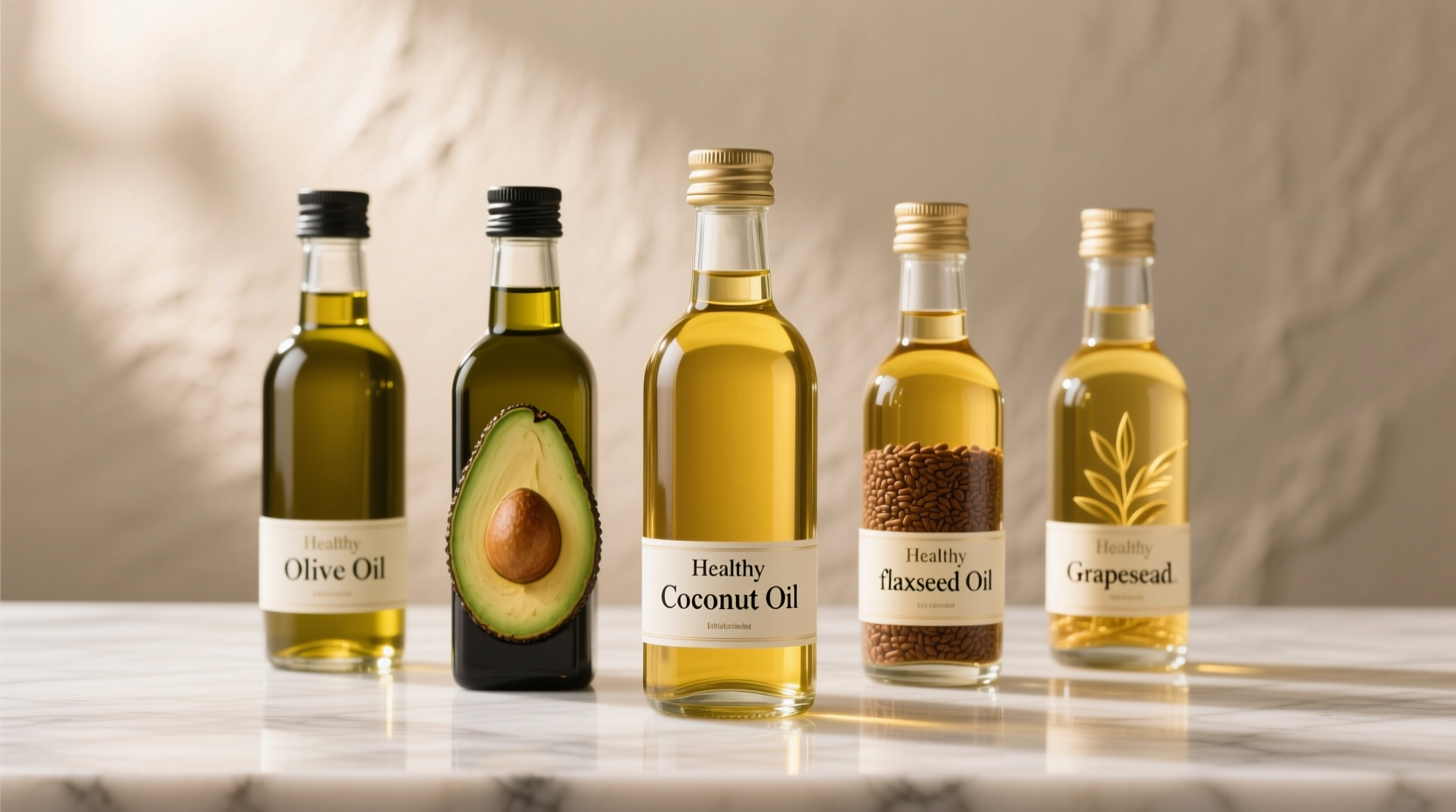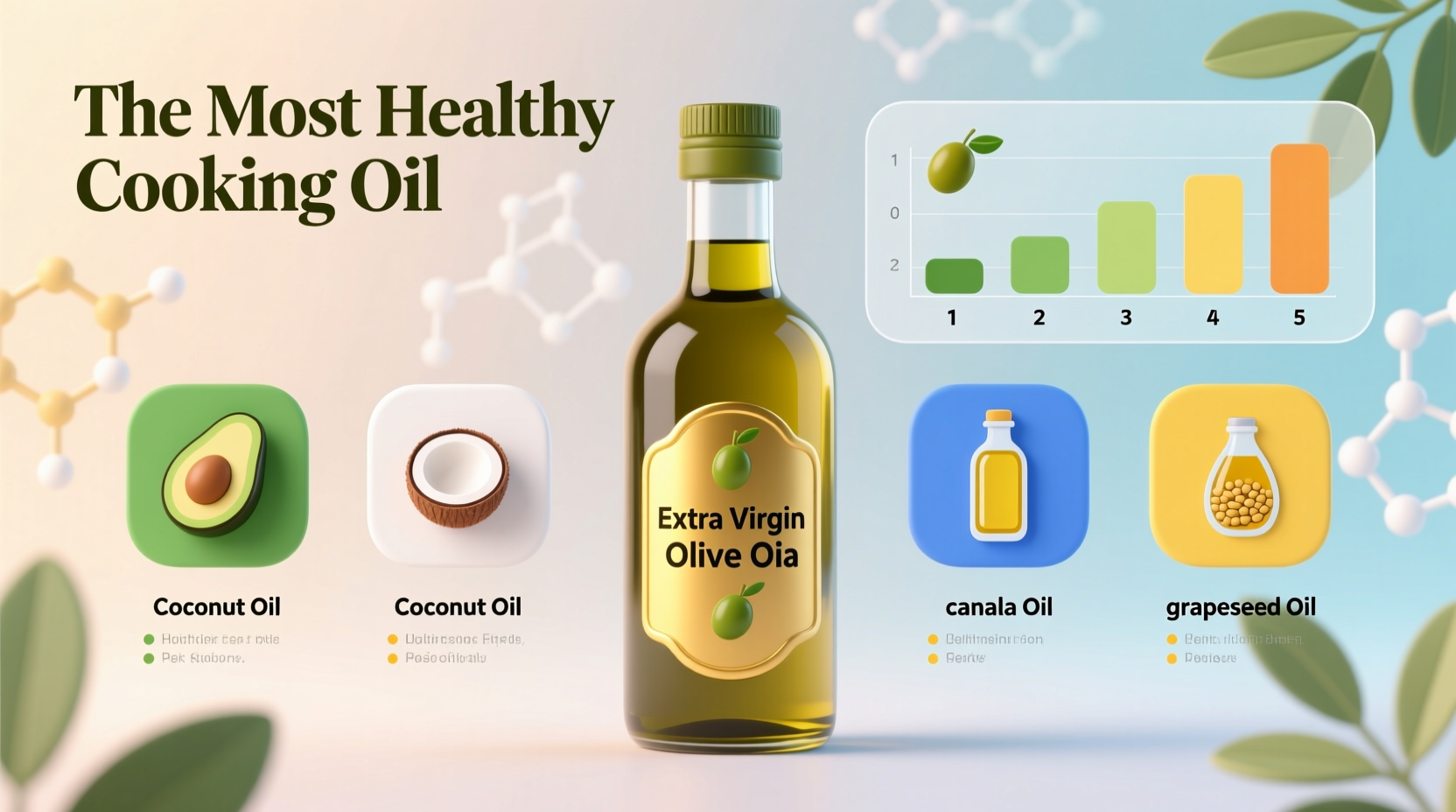Understanding Healthy Cooking Oil Fundamentals
When evaluating cooking oils, three critical factors determine their health impact: fatty acid composition, smoke point, and processing method. The American Heart Association recommends replacing saturated fats with unsaturated fats for cardiovascular health, making oils rich in monounsaturated and polyunsaturated fats generally preferable.
Contrary to popular belief, no single oil reigns supreme for all cooking scenarios. Different oils shine in specific applications based on their chemical properties. Understanding these differences helps you make informed choices that align with both health goals and culinary needs.
What Makes an Oil "Healthy"?
Scientific research shows that the healthiest cooking oils share several characteristics. According to a comprehensive review published in The BMJ, oils high in monounsaturated fats (like olive and avocado) and omega-3 polyunsaturated fats (like flaxseed) demonstrate the strongest evidence for reducing cardiovascular disease risk when used to replace saturated fats.
The processing method significantly impacts an oil's nutritional value. Cold-pressed, unrefined oils retain more natural antioxidants and phytochemicals than highly refined versions. The Harvard T.H. Chan School of Public Health emphasizes that minimally processed oils generally offer greater health benefits than their heavily refined counterparts.

Science-Backed Comparison of Top Cooking Oils
Understanding each oil's specific properties helps determine its best uses. The following comparison provides evidence-based insights into popular healthy cooking oil options:
| Cooking Oil | Smoke Point (°F) | Monounsaturated Fat | Polyunsaturated Fat | Best Uses |
|---|---|---|---|---|
| Extra Virgin Olive Oil | 320-375 | 73% | 11% | Salad dressings, low-heat cooking, finishing |
| Avocado Oil | 520 | 70% | 13% | High-heat cooking, grilling, roasting |
| Coconut Oil | 350 | 6% | 2% | Baking, medium-heat cooking (use sparingly) |
| Canola Oil | 400 | 62% | 32% | Medium-heat cooking, baking |
| Walnut Oil | 320 | 15% | 63% | Salad dressings, finishing (not for cooking) |
Contextual Guidance: Matching Oils to Cooking Methods
Your cooking technique determines which oil serves you best. Exceeding an oil's smoke point creates harmful compounds and destroys beneficial nutrients. The USDA's National Nutrient Database provides verified smoke point data that should guide your selection.
High-Heat Cooking (400°F+)
For searing, stir-frying, or deep-frying, avocado oil stands out with its high smoke point (520°F) and stable monounsaturated fat profile. A 2020 study in Food Chemistry confirmed avocado oil maintains its integrity better than olive oil at high temperatures, producing fewer harmful oxidation products.
Medium-Heat Cooking (300-400°F)
Canola oil works well for sautéing and baking due to its neutral flavor and balanced fat profile. The American Heart Association recognizes canola oil as a heart-healthy option when used in place of saturated fats. Extra light olive oil (not extra virgin) also performs well in this temperature range.
Raw Applications and Finishing
Extra virgin olive oil shines when used unheated. Its rich polyphenol content provides anti-inflammatory benefits that diminish with heating. The PREDIMED study, published in The New England Journal of Medicine, demonstrated that a Mediterranean diet supplemented with extra virgin olive oil significantly reduced cardiovascular events.
Evolving Scientific Understanding of Cooking Oils
Nutritional science regarding cooking oils has evolved significantly over the past decades. In the 1980s, all fats were considered harmful, leading to the low-fat diet craze. By the 1990s, we recognized the importance of fat quality over quantity. The 2000s brought understanding of trans fats' dangers, while current research emphasizes the benefits of specific unsaturated fats.
The Dietary Guidelines for Americans have progressively refined their recommendations, moving from simple "reduce all fats" to nuanced guidance about replacing saturated fats with unsaturated alternatives. This evolution reflects increasingly sophisticated understanding of how different fats impact health.
Practical Tips for Healthier Oil Use
Maximize the health benefits of your cooking oils with these evidence-based strategies:
- Store properly: Keep oils in dark glass containers away from heat and light to prevent oxidation
- Buy quality: Choose cold-pressed, unrefined oils when possible for maximum nutrient retention
- Use appropriate amounts: Even healthy fats are calorie-dense—measure rather than pour freely
- Rotate varieties: Different oils provide different phytonutrients—diversify your selection
- Check freshness: Rancid oils contain harmful compounds—smell before using
Common Misconceptions About Healthy Cooking Oils
Several persistent myths cloud understanding of healthy cooking oils. Contrary to popular belief, coconut oil's high saturated fat content (about 90%) makes it less heart-healthy than unsaturated alternatives, despite trendy claims. The American Heart Association specifically advises against coconut oil for heart health.
Another misconception suggests that all vegetable oils are unhealthy due to processing. While highly refined oils lose some nutrients, modern expeller-pressed methods create quality products. The key is choosing minimally processed options without artificial additives.
Making Informed Choices for Your Kitchen
Selecting the healthiest cooking oil requires balancing scientific evidence with practical kitchen needs. Keep two oils on hand for optimal flexibility: extra virgin olive oil for low-heat applications and dressings, and avocado oil for high-heat cooking. This combination covers most culinary scenarios while maximizing health benefits.
Remember that overall dietary patterns matter more than any single ingredient. The healthiest cooking oil supports, but doesn't define, a balanced diet rich in whole foods. As research continues to evolve, focus on evidence-based choices rather than trending fads.











 浙公网安备
33010002000092号
浙公网安备
33010002000092号 浙B2-20120091-4
浙B2-20120091-4